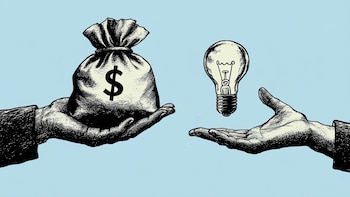
“Today, Mafalda's family in the 60s would be poor.” The metaphor chosen by the Director of the UCA Social Debt Observatory shoots at the symbolic heart of the middle class in a reality in which it is increasingly difficult to survive the social group that represented the dreams of progress and social mobility that broadly described Argentine society. Dreams of progress that, strangely enough, despite the decline and economic decline, sustain an ideology and continue to outline an identity.
Consumer analyst Guillermo Olivetto usually explains that more than 80% of Argentines perceive themselves as middle class, although technically many are not, because it is precisely a shared imagination. As if it were, rather than a social stratum accessed by income level, a choice of life, indissoluble with being Argentine. In that 80% can even fit those who are above or below in the social pyramid according to what they earn.
The growth of poverty in the context of policies that seem determined to multiply it and keep the poor poor poor, dependent on subsidies and without autonomy, has its worst face in the percentage of children living in poverty, who exceed 60% in the age group that reaches the age of 14. It is impossible not to count among them the many families who fell out of the punished middle class with which the current administration seems to be ruined, knowing that it is not the sector that mostly votes them.
Among the children of the so-called new poor people could be counted Mafalda according to the analysis of Agustín Salvia, when considering what he calls structural poverty. “We have been climbing 5 points of structural poverty every 5 years. Today we are hovering around a 40% floor with a 45% ceiling.”
Reality impossibly blurs the context of that cartoon in which a girl eager to progress in life was the heroine of the middle class interpreting her demands and motivations. Perhaps she was the first empowered girl in the 60s: modern, determined and intellectual. He knew that when he grew up he had a world within reach of his efforts. Today, more than 60 percent of children in the country who read their comics would feel out of that world because of their suffering. And worse, today, Mafalda could be among them, in the open of those who don't even finish high school, or those who by the thousands choose to leave the country.
A recent report by the consultancy firm Ecolatina warned that 1 in 3 middle-class households are considered poor. Poverty is stipulated in step with the rise in prices that pulverizes purchasing power, a phenomenon that continued to worsen in these months, falling with full force in the sectors that tried to sustain themselves in the last steps of that impoverished middle class. In order not to be poor, last month, a family needed 83,807 pesos and to avoid being destitute 37,413 pesos, the minimum wage being even lower than the level determined by indigence.
And here the most disturbing question arises: could it be Mafalda herself in the current context?

For many more families, the precipice of poverty looms in the increasingly unattainable account of the supermarket, and frustrations about the roads that are closed are more present than the prospects for the future.
That determined girl who even referred her understanding of the world asking for peace in the midst of the Cold War, today, in this invested Argentina, would run the risk of being part of a first generation of poor people in families of middle class tradition. “Save Mafalda”, could be the statement that summons us. It seems no coincidence that the mythology of a better life, embodied in the dreams of being middle class, has a girl as an archetypal figure, because the middle class is by definition the engine and vehicle of the future.
The phenomenon of inflation, with an acceleration that has not been seen for decades, condemns Argentines today to a hyper-present of unbearable fragility. Reality worsens in fast motion and the sum of uncertainties can be summarized in the price of bread. The future becomes a field of uncertain anguish and babbling.
When the President goes out like a jester to declare wars already lost, aggravating with his discursive recklessness until tomorrow's prices, when from power fierce fights are more and more divorced from reality, when the disputing winds blow in the governing coalition itself, it would seem candid to pretend Strain the pretensions of the future into a reflection of the day. Perhaps it seems like a dare, but it is an essential dare, the cry of “Do something seriously”.
Not only are the shelves emptied of products due to the scarcity they were able to produce with their economic ineffectiveness, but also of a minimal notion of the immediate horizon. You could say the same thing as that cartoon by Quino in which Mafalda is seen with his back to a globe on which a sign is affixed that reads: “Be careful! Irresponsible working.” Or appeal to that other comic, in which Mafalda appears with sad eyes and a band-aid in his hand to ask himself, “How does one stick this to his soul?”
KEEP READING:
Últimas Noticias
Debanhi Escobar: they secured the motel where she was found lifeless in a cistern

The oldest person in the world died at the age of 119

Macabre find in CDMX: they left a body bagged and tied in a taxi
The eagles of America will face Manchester City in a duel of legends. Here are the details

Why is it good to bring dogs out to know the world when they are puppies




